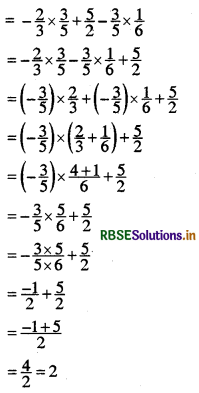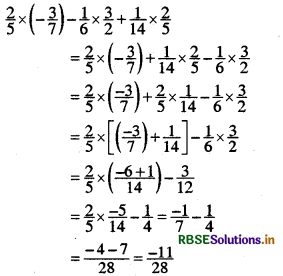RBSE Solutions for Class 8 Maths Chapter 1 Rational Numbers Ex 1.1
Rajasthan Board RBSE Solutions for Class 8 Maths Chapter 1 Rational Numbers Ex 1.1 Textbook Exercise Questions and Answers.
RBSE Class 8 Maths Solutions Chapter 1 Rational Numbers Ex 1.1
Question 1.
By using appropriate properties find.
(i) -\(\frac{2}{3} \times \frac{3}{5}+\frac{5}{2}-\frac{3}{5} \times \frac{1}{6}\)
Answer:

(ii) \(\frac{2}{5} \times\left(-\frac{3}{7}\right)-\frac{1}{6} \times \frac{3}{2}+\frac{1}{14} \times \frac{2}{5}\)
Answer:


Question 2.
Write the additive inverse each of the following.
(i) \(\frac{2}{8}\)
Answer:
Additive inverse of \(\frac{2}{8} = \frac{-2}{8}\)
(ii) \(\frac{-5}{9}\)
Answer:
Additive inverse of \(\left(\frac{-5}{9}\right)=\frac{5}{9}\)
(iii) \(\frac{-6}{-5}\)
Answer:
Given \(\frac{-6}{-5}\)
Additive inverse of \(\frac{6}{5}=\frac{-6}{5}\)
(iv) \(\frac{2}{-9}\)
Answer:
Given \(\frac{2}{-9}\)
Additive inverse of \(\frac{-2}{9}=\frac{2}{9}\)
(v) \(\frac{19}{-6}\)
Answer:
Given \(\frac{19}{-6}\)
Additive inverse of \(\frac{-19}{6}=\frac{19}{6}\)
Question 3.
Verify that - (- x) = x for
(i) x = \(\frac{11}{15}\)
Answer:
x = \(\frac{11}{15}\)
∴ -(-x) = -\(\left(-\frac{11}{15}\right)=\frac{11}{15}\) = x
(ii) x = \(-\frac{13}{17}\)
Answer:
∴ -(-x) = \(-\left\{-\left(\frac{-13}{17}\right)\right\}=-\left(\frac{13}{17}\right)=-\frac{13}{17}\) = x
Question 4.
Find the multiplicative inverse of the following:
(i) -13
Answer:
Multiplicative inverse of (- 13) is
(-13)-1 = \(\frac{1}{-13}\)
(ii) \(\frac{-13}{19}\)
Answer:
The multiplicative inverse of \(\left(\frac{-13}{19}\right)\) is
\(\left(\frac{-13}{19}\right)^{-1}=\frac{19}{-13}\)
(iii) \(\frac{1}{5}\)
Answer:
The multiplicative inverse of \(\left(\frac{1}{5}\right)\) is \(\left(\frac{1}{5}\right)^{-1}\) = 5
(iv) \(\frac{-5}{8} \times \frac{-3}{7}\)
Answer:
Given \(\frac{-5}{8} \times \frac{-3}{7}=\frac{-5 \times-3}{8 \times 7}=\frac{15}{56}\)
Multiplicative inverse of \(\frac{15}{56}\) is
\(\frac{15}{56}\)
(v) -1 × \(\frac{-2}{5}\)
Answer:
Given -1 × \(\frac{-2}{5}=\frac{-1 \times-2}{5}=\frac{2}{5}\)
Multiplicative inverse of \(\frac{2}{5}\) is \(\left(\frac{2}{5}\right)^{-1}=\frac{5}{2}\)
(vi) -1
Answer:
Multiplicative inverse of -1
(-1)-1 = \(\frac{1}{-1}\) = -1

Question 5.
Name the property under multiplication used in each of the following:
(i) \(\frac{-4}{5} \times 1=1 \times \frac{-4}{5}=-\frac{4}{5}\)
Answer:
Existence of Multiplicative identity.
(ii) \(-\frac{13}{17} \times \frac{-2}{7}=\frac{-2}{7} \times \frac{-13}{17}\)
Answer:
Commutative property of multiplication.
(iii) \(\frac{-19}{29} \times \frac{29}{-19}\) = 1
Answer:
Existence of multiplicative inverse.
Question 6.
Multiply \(\frac{6}{13}\) by the reciprocal of \(\frac{-7}{16}\)
Answer:
\(\frac{6}{13}\) × (the reciprocal of \(\frac{-7}{16}\))
= \(\frac{6}{13} \times\left(\frac{-7}{16}\right)^{-1}\)
= \(\frac{6}{13} \times \frac{16}{-7}=-\frac{96}{91}\)
Question 7.
Tell what property allows you to compute \(\frac{1}{3} \times\left(6 \times \frac{4}{3}\right)\) as \(\left(\frac{1}{3} \times 6\right) \times \frac{4}{3}\)
Answer:
Associative property of multiplication over rational numbers allows us to compute.
Question 8.
Is \(\frac{8}{9}\) the multiplicative inverse of -1\(\frac{8}{9}\)? Why or why not?
Answer:
No, \(\frac{8}{9}\) is not the multiplicative inverse of -1\(\frac{8}{9}\). Because \(\frac{8}{9} \times\left(-1 \frac{1}{8}\right)=\frac{8}{9} \times\left(\frac{-9}{8}\right)\)
= -1 ≠ 1
Question 9.
Is 0.3 the multiplicative inverse of 3\(\frac{1}{3}\)? Why or why not?
Answer:
Yes, 0.3 is multiplicative inverse of -3\(\frac{1}{3}\). Because 0.3 × 3\(\frac{1}{3} = \frac{3}{10} \times \frac{10}{3}\) = 1
Question 10.
Write:
(i) The rational number that does not have a reciprocal.
Answer:
We know that there is no rational number which when multiplied with 0, gives 1. Therefore the rational number 0 has no reciprocal.
(ii) The rational numbers that are equal to their reciprocals.
Answer:
We know that the reciprocal of 1 is 1 and the reciprocal of - 1 is - 1. 1 and - 1 are the only reciprocal numbers which are their own reciprocals.
(iii) The rational number that is equal to its negative.
Answer:
The rational number 0 is equal to its negative.

Question 11.
Fill in the blanks.
(i) Zero has _______________ reciprocal.
Answer:
No
(ii) The numbers _______________ and _______________ are their own, reciprocals.
Answer:
1, -1
(iii) The reciprocal of - 5 is _______________
Answer:
\(\frac{-1}{5}\)
(iv) Reciprocal of \(\frac{1}{x}\) where x ≠ 0 is _______________
Answer:
x
(v) The product of two rational numbers is always a _______________
Answer:
rational number
(vi) The reciprocal of a positive rational number is _______________
Answer:
positive.
